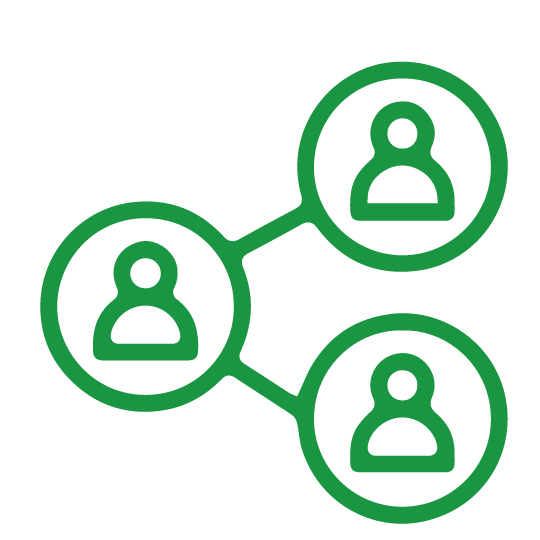Het vakgebied van projectmanagement is continu in beweging. Project/programmamanagers, portfoliomanagers en PMO-ers moeten continu en steeds sneller hun manier van werken moeten aanpassen om relevant te blijven. Gelukkig maken de consultants van IMPROVEN elk jaar een overzicht van de belangrijkste trends en ontwikkelingen op het gebied van project-, programma-, projectportfolio management & PMO. Deze trends bieden cruciale inzichten om projecten succesvoller te managen en beter in te spelen op veranderingen en behoefte.
1. Realisatie van de strategie
Projectportfolio Management wordt steeds meer als essentieel onderdeel erkend voor de realisatie van de bedrijfsstrategie, waarbij projecten en programma’s een directe relatie hebben met de strategische doelen van de organisatie. De integratie van project portfoliomanagement is cruciaal om ervoor te zorgen dat projecten en programma’s niet alleen op zichzelf succesvol zijn, maar ook bijdragen aan de visie en strategische doelen van de organisatie en dus waarde toevoegen. Een goede integratie helpt verder bij het effectief beheren en toewijzen van de (schaarse) middelen over de projecten, waardoor conflicten over de inzet van mensen en middelen worden verminderd en organisaties zodoende met minder middelen toch hun strategische doelen kunnen behalen.
2. Van PMO naar SRO
Als gevolg van de eerstgenoemde trend, of soms zelfs als katalysator, evolueren centrale PMO’s naar een zogenaamd Strategy Realization Office (SRO). In het SRO worden projecten en programma’s uit de organisatie gekoppeld aan de organisatiedoelstellingen en daarbij nieuwe noodzakelijke initiatieven opgestart. Het SRO speelt een cruciale rol in de informatiestromen, besluitvorming en bij de realisatie van de doelen. Een SRO zal de mensen, middelen, processen en projecten effectief en efficiënt beheren. Dit leidt tot minder verspilling van tijd en middelen en verlaging van de (faal)kosten. Tevens verhoogt het de transparantie in de status en resultaten van projecten en programma’s. Het SRO helpt het management bij het nemen van beslissingen en bij het anticiperen op mogelijke problemen.
3. AI, real-time besluitvorming & change management
Real-time data, inzichten en analyses wordt steeds belangrijker voor de besluitvorming binnen projecten, programma’s en portfolios, waarbij geavanceerde dashboards actuele inzichten bieden in bijvoorbeeld kosten, resources en planningen. Toegang tot real-time data maakt het mogelijk om tijdig geïnformeerde beslissingen te nemen, wat leidt tot hogere nauwkeurigheid en minder fouten. Door gebruik te maken van real-time besluitvorming kunnen organisaties hun concurrentievoordeel vergroten, de efficiëntie verbeteren en betere resultaten behalen in hun strategie realisatie. De volgende stap, predictive decision making, is door de inzet van AI in projecten en portfolio’s maar een kleine stap van ons vandaan. De impact van AI op het vak begint steeds duidelijk te worden; gespreksverslagen en actielijsten laten genereren door een AI assistent is slechts het begin. Onlangs zagen we AI bijvoorbeeld toegepast worden in change management, waarbij door middel van voorspellende analyses de potentiële weerstand werd geïdentificeerd, voordat die zich voordeed. De passende interventie werd vervolgens ook met behulp van AI ontworpen.
4. Hybride projectmanagement – fit-for-purpose
Er is al langere tijd een groeiende belangstelling voor hybride projectmanagementmethodologieën die verschillende benaderingen (waterval, agile, etc.) combineren, om aan de specifieke behoeften van de organisatie voor de realisatie van veranderingen te voldoen. Improven is groot voorstander van een pragmatische combinatie van bewezen elementen uit traditioneel projectmanagement en waardevolle aanvullingen uit agile, om veranderingen te realiseren. Hybride projectmanagers creëren een op maat gemaakte aanpak die past bij de specifieke behoeften van het project of de organisatie. Dit betekent ook dat de projectmanagers van de toekomst van alle markten thuis zijn en zich niet laten beperken door een aanpak waar ze een certificaat voor hebben gehaald. In de komende jaren zal het bewustzijn blijven groeien dat het kiezen voor één enkele best practice aanpak, voor veel organisaties te beperkend zal zijn. In de markt zien wij nu al het aantal grootschalige agile transformaties teruglopen en hier en daar zelfs teruggedraaid worden.
5. Duurzaamheid in èn door projectmanagement
Duurzaamheid (sustainability) is belangrijker dan ooit en zal een steeds grotere rol gaan spelen in onze projecten en programma’s. Het is de verantwoordelijkheid van elke organisatie dat duurzaamheidsdoelstellingen door projecten worden gerealiseerd. Evenzo is het van belang dat projecten op een duurzame manier worden uitgevoerd. Door de brede definitie en interpretatie van de term duurzaamheid, is het voor organisaties belangrijk eerst te definiëren wat duurzaamheid betekent, bijvoorbeeld aan de hand van de 17 Duurzame Ontwikkelingsdoelen van de VN. De projectmanager kan vervolgens vaststellen hoe het project kan bijdragen aan die duurzaamheidsdoelen. Een duurzaam project kan enerzijds zorgen voor duurzame uitkomsten (bijv. een realisatie van een zonnepark), maar ook al tijdens de realisatie van het project kan er gekozen worden voor een economisch haalbare, milieuvriendelijke en maatschappelijk verantwoorde aanpak. Een projectmanager zal de balans moeten zien te vinden tussen wat stakeholders (people) willen en kunnen, wat de aarde (planet) ter beschikking stelt en wat financieel rendabel is (profit).
6. Extra focus op ontwikkelen van projectmanagement vaardigheden
Projectmanagement volgt vooraf een bepaalde aanpak en standaard processen. Lang hebben we gedacht dat als een projectmanager de processen volgt en de juiste templates invult, het project succesvol zal zijn. Gelukkig zien we een duidelijke beweging naar het ontwikkelen van bredere projectmanagement gerelateerde vaardigheden en gedrag, zoals bijvoorbeeld technische vaardigheden, interpersoonlijke vaardigheden en managementvaardigheden. Een projectmanager met een breder scala aan deze vaardigheden zal effectiever kunnen opereren in het stakeholderveld, beter kunnen aansluiten bij de verwachtingen van de eindgebruikers en dus succesvoller de verandering kunnen opleveren.

7. Behavioral projectmanagement
Behavioral projectmanagement richt zich op de menselijke aspecten van projectmanagement, zoals motivatie, communicatie, teamdynamiek, maar ook betere besluitvorming. Het erkent dat de manier waarop mensen zich gedragen en samenwerken een grote invloed heeft op het succes van een project. Expertise van een projectmanager op het vlak van interpersoonlijke processen zal leiden tot verbeterde communicatie, betere teamdynamiek, hogere motivatie, effectiever leiderschap, betere besluitvorming en dus tot succesvollere projecten.
8. Capaciteitsmanagement
Capaciteitsmanagement draait om het effectief voorspellen en toewijzen van middelen om aan de (toekomstige) vraag te voldoen. Dit proces omvat het identificeren van de benodigde vaardigheden en middelen, het evalueren van de huidige capaciteit en het nemen van maatregelen om eventuele tekorten aan te vullen. Capaciteitsmanagement krijgt meer aandacht in project- en portfoliomanagement vanwege de toenemende vraag naar producten en diensten, wat leidt tot een hogere werkdruk en daarbij een grotere behoefte aan efficiënte inzet van middelen. Daarnaast kampen veel organisaties met personeelstekorten, waardoor het cruciaal is om de beschikbare capaciteit optimaal te benutten. Goed capaciteitsmanagement helpt organisaties om beter in te spelen op veranderingen en knelpunten tijdig te identificeren, wat essentieel is in een dynamische markt. Door proactief te plannen, kunnen organisaties kosten verlagen, prestaties verbeteren en ervoor zorgen dat de juiste middelen op het juiste moment beschikbaar zijn.
9. Flexibel werken & remote teams
In hybride of flexibel werken wordt werken op kantoor gecombineerd met bijvoorbeeld thuiswerken of zelfs op veel exotischere locaties. Deze manier van werken wint nog steeds terrein, ondanks andere berichten in de media. Deze manier van werken lijkt beter te resoneren met jongere collega’s uit de nieuwe generaties. . Door hier goed mee om te gaan, kunnen organisaties nieuwe medewerkers aantrekken en behouden, onafhankelijk van de geografische locatie. Dit vergroot de pool van potentiële talenten. Het geven van vrijheden en eigen verantwoordelijkheid aan collega’s leidt tot hogere motivatie en loyaliteit, wat weer leidt tot betere prestaties en lager personeelsverloop; een groot voordeel in een krappe arbeidsmarkt! De effectieve samenwerking is echter de grote uitdaging! Die effectiviteit is bijvoorbeeld minder wanneer teamleden in verschillende tijdzones werken, er een gebrek aan teamgevoel ontstaat of er slecht inzicht is in wat de anderen aan het doen zijn. Bij hybride werken moet voldoende aandacht zijn voor ondersteunende tools die real-time samenwerking en transparantie ondersteunen.
10. Doorontwikkeling van projectmanagement tools
De doorontwikkeling van projectmanagement tools is een dynamisch proces dat inspeelt op de veranderende behoeften van organisaties en projectteams. Moderne tools richten zich op het verbeteren van efficiëntie, samenwerking en flexibiliteit. Dit omvat de integratie van kunstmatige intelligentie voor geautomatiseerde taken, verbeterde visualisatie van projectdata, en naadloze integratie met andere software zoals CRM- en ERP-systemen. Daarnaast wordt er steeds meer aandacht besteed aan gebruiksvriendelijkheid en toegankelijkheid, zodat teams wereldwijd effectief kunnen samenwerken. Tegelijkertijd zien we een tegengestelde ontwikkeling, waarbij kleine organisaties zonder grote IT-budgetten ervoor kiezen om een eenvoudige PM-tool zelf te bouwen, door slim gebruik te maken van MS Teams, Sharepoint, PowerApps en PowerBI: er kan al heel veel met de standaard Microsoft Suite.
Het is belangrijk om aan de verandercapaciteit van uw organisatie te blijven werken. Mocht u meer informatie willen over één van de genoemde trends of bent u benieuwd hoe Improven uw organisatie op een andere manier kan helpen, neem dan contact op met Maarten van Weeghel (maarten.van.weeghel@improven.nl of 06-12 999 575).























